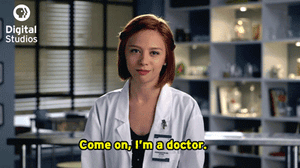Googling Your Diagnosis Vs. Visiting Your Eyecare Practice
With the rise of the ePatient and increases in technology, more patients are turning to online sources for health information, but what happens when patients begin relying on those resources to self-diagnose instead of seeing a licensed professional? According to the Pew Reseach Center, 59% of US adults have looked online for health information in the past year. Of those adults, 35% didn’t visit a clinician to get a professional opinion.
There are many dangers of self-diagnosing online, that is why we have created this patient focused article that discusses the difference between googling symptoms versus receiving an actual diagnosis from a professional. We hope that both you and your patients find the information helpful. It's all the more reason to help your patients by being a reliable source of health information for them!
Self-Diagnosis Vs. Your Eyecare Practice
Self-Diagnosis: You'll become a Cyberchondriac

Cybercondria is anxiety concerning one’s wellness, brought on by visiting health and medical websites. Basically, when you self-diagnosis yourself online, you become so overwhelmed by information, you begin to assume the worst, regardless of how much you are actually at risk for whatever it is you think you might have.
Seeing Your Optometrist: You'll get a Professional Analysis of Symptoms and Risks

What’s the difference between you and your eye doctor? You spent multiple hours online researching everything that could possibly be wrong with you; your doctor spent multiple years studying eye health, and can tell you what is actually wrong with you. Your optometrist is a trained and licensed professional. They are experts at not only analyzing any symptoms you are experiencing, but also combining those symptoms with your actual risk for various conditions, to give you an accurate diagnosis. Based off of their analysis, your optometrist can then provide you with patient education materials that will be relevant to any conditions you may have, or are at risk for.
Self-Diagnosis: Unreliable Information Leads to Incorrect Treatment

The problem with the Internet is that practically anyone can post whatever they want online. If you aren’t careful you can stumble across unreliable information leading to an incorrect diagnosis and wrong treatment, which can either be inefficient or even worsen your condition. Even if you find accurate information online, you are still at risk for misdiagnosing yourself.
Seeing Your Optometrist: Accurate Diagnosis and Treatment

Remember all that time your OD spent in optometry school? That was so they could learn to provide accurate diagnoses for patients and provide the best treatment. Your eyes are too important to risk their health. It is best to leave diagnosis and treatment to the professionals. We know you are going to look on the Internet for health information and that is okay. We just suggest looking to your healthcare providers' websites first. Your OD can share educational materials with you about your diagnosis, conditions you might be at risk for, and treatment instructions, all from one simple place.
Self-Diagnosis: You're on Your Own

Have you ever heard the saying that the mind is a very dangerous thing? That’s because it can be, especially when you’re left alone with your thoughts. When you attempt to self-diagnose you’ll have the tendency to jump to extreme conclusions in either direction, but both can be dangerous. You can either lead yourself to thinking something is seriously wrong, which can add unnecessary stress to your life, or you can be led to thinking that nothing is wrong at all, which means you could be delaying seeing an OD while allowing your condition to worsen.
Seeing Your Optometrist: Relationship-Based Care

The great thing is that when it comes to eyecare, you don’t have to go it alone. Your eye doctor is trained to offer relationship-based care, meaning that they are personalizing your health experience by taking into consideration your pre-existing conditions and medical history. They have the technology in their practice to provide you with high-quality health information that will help you be an active participant in your healthcare, with the added comfort of reliability. EHR software is only improving, and as it progresses it allows for healthcare entities to become more cohesive helping to provide you with the best possible care.
While there is some valuable health information online, it is always best to be cautious when searching online. We suggest asking your eye doctor to help provide you with reliable and accurate eye health educational materials. If you ever have a question or concern about your eyes, be sure to contact your local eyecare practice!
ODs, don't miss out on great tips for the eyecare industry, subscribe to our blog!

